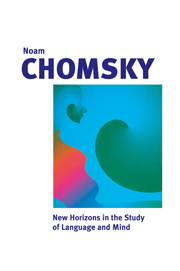Book contents
- Frontmatter
- Contents
- Foreword by Neil Smith
- Acknowledgements
- Introduction
- 1 New horizons in the study of language
- 2 Explaining language use
- 3 Language and interpretation: philosophical reflections and empirical inquiry
- 4 Naturalism and dualism in the study of language and mind
- 5 Language as a natural object
- 6 Language from an internalist perspective
- 7 Internalist explorations
- Notes
- References
- Index
2 - Explaining language use
Published online by Cambridge University Press: 05 June 2012
- Frontmatter
- Contents
- Foreword by Neil Smith
- Acknowledgements
- Introduction
- 1 New horizons in the study of language
- 2 Explaining language use
- 3 Language and interpretation: philosophical reflections and empirical inquiry
- 4 Naturalism and dualism in the study of language and mind
- 5 Language as a natural object
- 6 Language from an internalist perspective
- 7 Internalist explorations
- Notes
- References
- Index
Summary
In his John Locke lectures, Hilary Putnam argues “that certain human abilities – language speaking is the paradigm example – may not be theoretically explicable in isolation,” apart from a full model of “human functional organization,” which “may well be unintelligible to humans when stated in any detail.” The problem is that “we are not, realistically, going to get a detailed explanatory model for the natural kind ‘human being’,” not because of “mere complexity” but because “we are partially opaque to ourselves, in the sense of not having the ability to understand one another as we understand hydrogen atoms.” This is a “constitutive fact” about “human beings in the present period,” though perhaps not in a few hundred years (Putnam 1978).
The “natural kinds” human being and hydrogen atom thus call for different kinds of inquiry, one leading to “detailed explanatory models,” the other not, at least for now. The first category is scientific inquiry, in which we seek intelligible explanatory theories and look forward to eventual integration with the core natural sciences; call this mode of inquiry “naturalistic,” focusing on the character of work and reasonable goals, in abstraction from actual achievement. Beyond its scope, there are issues of the scale of full “human functional organization,” not a serious topic for (current) naturalistic inquiry but more like the study of everything, like attempts to answer such pseudo-questions as “how do things work?” or “why do they happen?”
Information
- Type
- Chapter
- Information
- New Horizons in the Study of Language and Mind , pp. 19 - 45Publisher: Cambridge University PressPrint publication year: 2000
Accessibility standard: Unknown
Why this information is here
This section outlines the accessibility features of this content - including support for screen readers, full keyboard navigation and high-contrast display options. This may not be relevant for you.Accessibility Information
- 5
- Cited by
